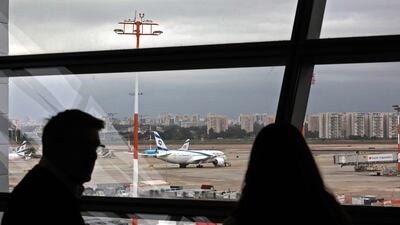Israel reopened its borders to tourists on Sunday after a brief ban imposed to curb cases of the fast-spreading Omicron variant.
The decision to relax border rules comes amid a record level of coronavirus cases in the country.
“We will find the balance between a functioning economy and management of the crisis,” Prime Minister Naftali Bennett said on Sunday.
Israel barred visitors in late November after Omicron emerged in South Africa.
Officials also prevented citizens and residents from travelling to dozens of countries with high infection rates, including the UK and the US.
The so-called “red list” was scrapped on Friday because the vast amount of infections now are transmitted locally, not among travellers, the Health Ministry said.
Under the new rules, most travellers who are vaccinated against the coronavirus or have recovered from Covid-19 are allowed to visit Israel and the Palestinian Territories. Additional testing is required.
In the past week, Israel has recorded an average of 14,270 cases daily, Health Ministry data show.
The latest figures reflect a surge in cases compared with a month ago, when there were 579 cases daily among the population of nine million.
“This wave will not last forever,” Mr Bennett said at the start of a Cabinet meeting.
“There will be several tough weeks but we will get through them together.”
The prime minister said free coronavirus tests were being given to young children and teachers, as well as to residents of retirement homes. The general population is facing a shortage of tests and high prices at pharmacies.
While the decision to welcome visitors could bring a boost to the economy, those working in the tourism industry remain hesitant.
“The government constantly changes the rules. It’s very difficult to work with,” said Ganit Peleg, chairwoman of Israel’s Tour Guide Association.
Tourists were welcomed back on November 1 for the first time since the pandemic began, but by the end of the month, owing to Omicron, the ban had been reimposed.
“Right now we can’t predict anything,” said Ms Peleg. “I can’t compare it to a war situation, but in a way it’s something that can give you the same feeling. The uncertainty.”
She said some unemployed guides were relying on food parcels, despite a government support package for the tourism industry.
“Your schedule was full two years ahead, and suddenly everything collapsed like cards,” Ms Peleg said about the start of the pandemic.
The ban on visitors has also affected residents in the Palestinian territories, because Israel controls the borders.
The absence of tourists last month hit particularly hard in Bethlehem, the city in the occupied West Bank where Christians believe Jesus was born.
Salwa Musallam, a tour guide in the town, had all her tours cancelled over the Christmas period because of border restrictions.
“In November I had two buses and I was so happy. Finally I got some money in my hands after about two years. And then, it’s gone,” she said.
On Sunday, the Palestinian Health Ministry announced 251 new coronavirus cases in the West Bank, home to about three million people.
The Palestinian Authority, which has limited rule in the West Bank, arranged some cash handouts at the start of the pandemic.
But it has no long-term programme to support those forced out of work by Covid-19.
“The pandemic didn’t just affect me or tourism. In Bethlehem we are all connected. If I have the money, I go shopping, I buy food, I buy clothes, I buy furniture,” Ms Musallam said.
Many tourists plan their trips months in advance, meaning there will be some delay until tour buses line up outside famous sites once more.
“One group per week, I’m happy. One per month, I’m happy,” Ms Musallam said.
“Anything will do for now.”






















